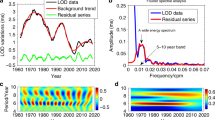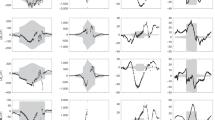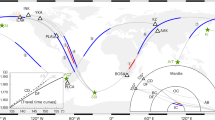Abstract
THERE have been many determinations of the acceleration of the Moon's mean longitude, mostly based on observations of occultations since 1680 and on records of ancient eclipses1–9. All these results have been expressed in Ephemeris Time, based on the annual apparent motion of the Sun about the Earth. Since 1955 Atomic Time came into use based on the period of oscillation of the caesium atom which is, by definition, constant. A new analysis of lunar occultations observed from 1955 to 1974 using Atomic Time, by Van Flandern (unpublished) gives a value for the acceleration of the Moon's mean longitude differing from other determinations which used the Ephemeris Time scale. His new results differ from earlier work10. The data reveal a difference between Ephemeris Time and Atomic Time of 25 s a century. Van Flandern suggests that the most probable explanation is a decrease in the gravitational constant, G, by 8 parts in 1011 per yr. Such a decrease would mean that the Earth is expanding somewhat and there is some geological evidence supporting this. We tried to check this conclusion using a method for determining the lengthening of the day verified by Wells11 in which the number of tiny lines of ridges on well preserved epitheca of corals in their annual growth increments are counted. We found no evidence for any expansion of the Earth in the past 5 × 108 yr.
This is a preview of subscription content, access via your institution
Access options
Subscribe to this journal
Receive 51 print issues and online access
$199.00 per year
only $3.90 per issue
Buy this article
- Purchase on Springer Link
- Instant access to full article PDF
Prices may be subject to local taxes which are calculated during checkout
Similar content being viewed by others
References
de Sitter, W., Bull. Astr. Insts. Neth., 4, 21 (1927).
Spencer Jones, H., Mon. Not. R. astr. Soc., 99, 541 (1939).
Clemence, G. M., Astr. J., 53, 169 (1948).
Morrison, L., The Moon, 5, 253 (1972).
Murray, C. A., Mon. Not. R. astr. Soc., 117, 478 (1957).
Newton, R. R., J. geophys. Res., 73, 3765 (1968).
Oesterwinter, C., and Cohen, C. J., Celest. Mech., 5, 317 (1972).
Curott, D. R., Astron. J., 71, 264 (1966).
Muller, P. M., and Stephenson, F. R., in Growth Rhythms and History of the Earth's Rotation (edit by Rosenberg, G. D., and Runcorn, S. K.), (John Wiley and Sons, London, 1974).
Morrison, L., Nature, 241, 519 (1973).
Wells, J. W., Nature, 197, 948 (1963).
Panella, G., MacClintock, G., and Thompson, J., Science, 162, 792 (1968).
Scrutton, C. T., Palaeontology, 7, 552 (1964).
Holmes, A., Principles of Physical Geology, 2nd rev. ed., 34 (Nelson, London, 1964).
Wesson, P., Q. Jl R. astr. Soc., 14, 9 (1973).
Author information
Authors and Affiliations
Rights and permissions
About this article
Cite this article
VAN DIGGELEN, J. Is the Earth expanding?. Nature 262, 675–676 (1976). https://doi.org/10.1038/262675a0
Received:
Accepted:
Issue Date:
DOI: https://doi.org/10.1038/262675a0
Comments
By submitting a comment you agree to abide by our Terms and Community Guidelines. If you find something abusive or that does not comply with our terms or guidelines please flag it as inappropriate.



